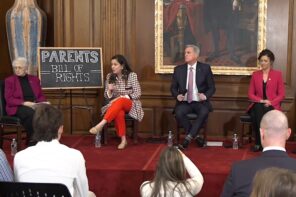What inspired you to write Evil Incarnate? What sparked your interest?
I had long been interested in why rumors or legends about subversive cults—witches, heretics, Jews, “cultists”—always seemed to focus on images of cannibalism, infanticide, and orgy, often in graphic connection. I had put this interest aside in the mid-1980s, but by the late 1980s this country was awash in rumors of Satanic cults—infiltrating nursery schools, sexually abusing and impregnating young girls, manipulating adults and youths, etc. etc. I was especially interested in the popular focus on “ritual” Satanic abuse, for it seemed to bespeak a dark sense to ritual. What was going on in this country? Why were ancient tales of gothic evil being recycled among secular mental health professionals? I spent the 1990s and early 2000s trying to think of how this all worked, and how comparative religions as a discipline could contribute to contemporary panics. (I give a more personalized account of this process of inspiration in a lecture recently published in French in the journal Le Terrain (#50, 2008).
What’s the most important take home message for readers?
The most important take-home message is that “evil” is a way of evaluating atrocities and misfortunes, both real and imagined, rather than something “out there,” and that when people historically have talked, conceptualized, and believed themselves to be confronting real evil they have allowed themselves the most extreme forms of cruelty in combatting it. “Real evil,” I would say, arises from the discourse of evil, whether that comes from Christianity, witch-cleansing movements, racism, or nationalistic hatred of the other.
Is there anything you had to leave out?
I had to dispense with systematic discussions of the various images of monstrous danger in Asian societies that DON’T amount to “evil” in the Christian sense. I had to dispense with systematic histories of various witch-hunting movements in Europe. (But here the book was realy about the the capability of comparison to form answers about the human imagination; and in that sense I go beyond straight historical context). I also left out statements about the discourse of “terrorism” (which I believe to be a new type of “evil” discourse) and contemporary politics; about the culpability of Christianity or simply monotheism in forming an inflammatory concept of evil (since I am unsure of this culpability); and about the ways people have averted or risen above these images of evil to sow peace and tolerance (since this was not my topic).
What are some of the biggest misconceptions about your topic?
The biggest misconception about the term evil is that it is merely a quality of experience or history, not a way of evaluating events or people—of setting them outside moral comprehension, depicting them as monsters. I find the intellectual high-mindedness of the typical recent discussions of evil to be too restricted from historical responses and from the rich imaginative world that brings “evil” to life for people.
Did you have a specific audience in mind when writing?
I envisioned the literate, curious non-academic reader (NYRB, NYT, Atlantic, etc.), but also I wanted to lay down some observations, principles, and ideas, and that latter goal unfortunately required some more complex writing.
Are you hoping just to inform readers? Give them pleasure? Piss them off?
I hope to inform readers, to spark discussion and self-criticism.
What alternative title would you give the book?
My wife came up with the title, and everybody I know likes it a lot. I’m very satisfied. The sub-title was a bit of a challenge, though!
How do you feel about the cover?
I chose the cover, and I appreciate Princeton Press’s going with it. Goya prints and paintings cover many recent books on evil and witchcraft, so the challenge is always to find a new one by Goya!
Is there a book out there you wish you’d written? Which One? Why?
The books that most inspired me were by historians who inserted sections of penetrating cultural or comparative analysis in otherwise quite historically circumscribed tomes: Norman Cohn’s Europe’s Inner Demons, Robin Briggs’s Witches and Neighbors, Lyndal Roper’s Witch-Craze. I was not so interested in focusing on particular periods myself, but in following up their broader observations with a book devoted to the such.
What’s your next book?
My next book will return to the subject of my principal expertise, the Christianization of Egypt and the various social worlds in which Egyptian and Christian traditions were combined. I use anthropology and comparative approaches in this book too.




